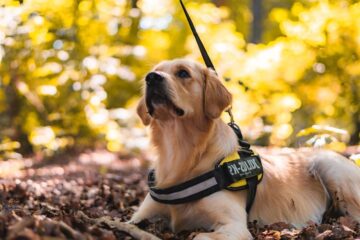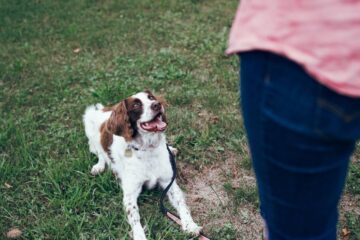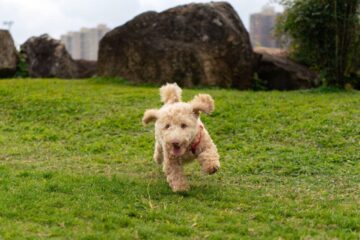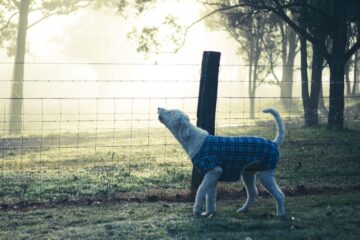Ask Yourself…
- Is your dog a puppy? They may need more potty training or more frequent walks.
- Is your dog elderly? They may suffer from urinary incontinence.
- Could your dog have separation anxiety?
- Is your dog intact? Spaying or neutering them may stop them from marking their territory.
- Is your pup afraid of people or other dogs?
- Does your dog have symptoms of a UTI or bladder stones?
- Have you potty-trained your dog well?
- Could your dog be seeking attention that you aren’t giving them lately?
- Could something be stressing your dog out?
If you’re a dog owner, then you know that dogs love to pee. And sometimes, they like to do it inside the house. While there could be many reasons why your dog is peeing in the house, there are some things you can do to stop them from doing it. In this blog post, we’ll answer the question: “why is my dog peeing in the house?”
Why Is My Dog Peeing in the House? A Common Problem
Dogs urinate for many reasons. They might need to go to the bathroom, or they might be marking their territory. If your dog is peeing in the house, you should figure out why he’s doing it so that you can stop him from doing it again.
This is a common problem not only for first-time dog owners but also for experienced dog owners. Dogs that have never had a problem with urinating inside the house may suddenly start doing it for no apparent reason. Why is my dog peeing in the house? Don’t worry – you can fix the problem!
Why Do Puppies Pee Indoors
Puppies have small bladders and can’t hold their urine for very long. That’s why it’s necessary to take them outside often so they can relieve themselves. If you don’t take your puppy out often enough, they’ll likely start peeing in the house.
In addition, puppies are still learning where they should and shouldn’t go to the bathroom. They haven’t yet learned that it’s not okay to urinate in the house. With time and patience, you can train your puppy not to pee inside.
Older Dogs That Start Peeing Indoors
If your dog is house-trained but suddenly starts urinating indoors, it could be a sign of a medical problem. Urinary incontinence, for example, is a common issue in older dogs. If your dog is urinating involuntarily, they may not be able to control their bladder and may start peeing in the house.
Adult Dog Peeing in the House: Separation Anxiety
Why is my dog peeing in the house? Another reason why an adult dog might start doing this is separation anxiety. If your dog is used to being around people all the time and is suddenly left alone for long periods of time, they may become anxious and start urinating in the house.
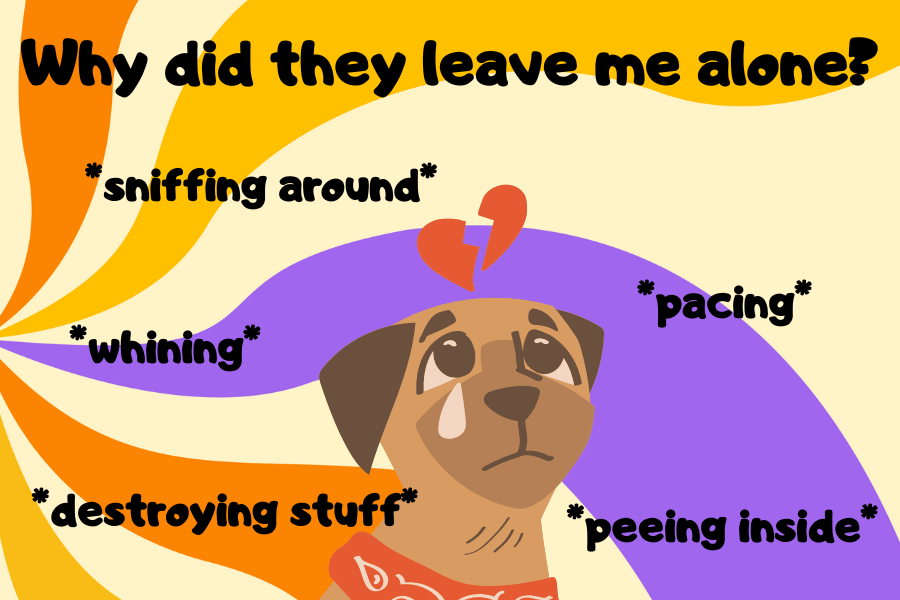
Dogs with separation anxiety often have trouble relaxing when they’re not around their owners. They may pace, whine, or bark when left alone.
Urinating to Mark Territory
Male dogs are more likely to mark their territory than female dogs, but any pup can do it. When a dog urinates, he releases pheromones that communicate to other dogs that this is his territory. Dogs that are not neutered or spayed are more likely to mark their territory than those that are.
Editor’s Note ✏️
I recently spoke with a dog behaviorist about why dogs mark their territory with urine. He explained that it’s a normal behavior for dogs, and it’s their way of „talking” with other animals in the area. It can actually communicate three different things: territoriality („it’s my land!”), readiness for mating („come here, I’m in heat!”), and anxiety („don’t come close!”).
Submissive Urination
When a dog feels scared or threatened, he may start urinating to show that he is not a threat. This is different from separation anxiety, as the dog is not necessarily anxious when he’s not around people. He may be afraid of people or other dogs and start urinating when he’s around them.
Why is my dog peeing in the house? Read on for medical reasons!
Medical Conditions: Urinary Tract Infections
UTIs are common in dogs and caused by bacteria that enter the urinary tract through the urethra. Dogs with UTIs often urinate more frequently and may have blood in their urine. If your dog is urinating more frequently than usual and seems to be in pain when they urinate, they may have a UTI.
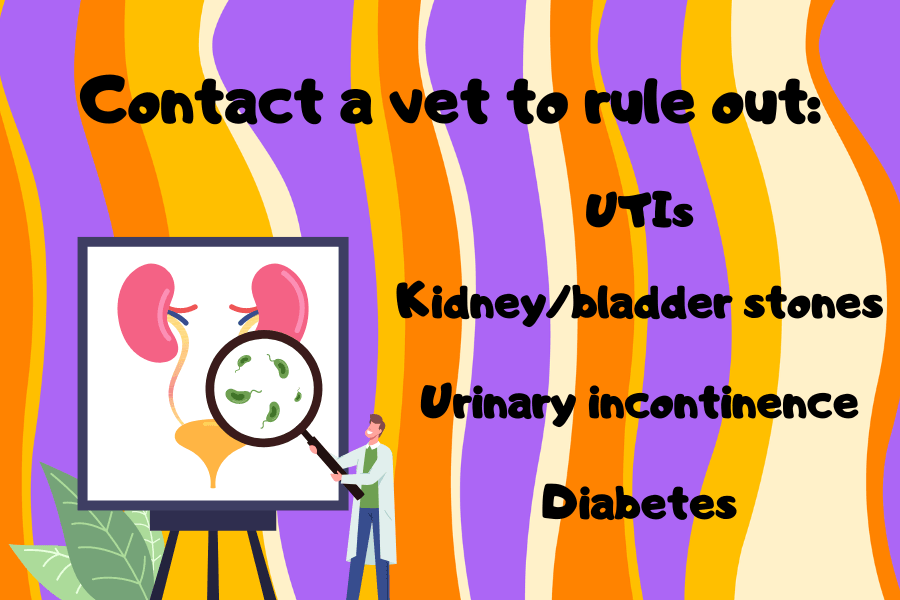
Bladder Stones
Bladder stones are hardened deposits of minerals that form in the urinary tract. They can be very painful and make it difficult for your dog to urinate on walks, in which case they may try again later in the house.
Your Dog Might Suffer From Incontinence
Incontinence is the loss of control over the bladder. Dogs with incontinence often leak urine when they’re sleeping or when they’re relaxed. If your dog is leaking urine, talk to your veterinarian so that he can diagnose the problem and find a treatment.
Why Is My Dog Peeing in the House? Other Urinary Issues
There are a number of other medical conditions that can cause a dog to relieve themselves indoors. Kidney disease, for example, can cause a dog to drink more water and urinate more frequently. Diabetes can also cause increased urination.
Your Dog Is Not Well Potty-Trained
Why is my dog peeing in the house? This is more common in puppies, but it can happen with adult dogs as well. Dogs that did not go through potty training often have accidents in the house because they don’t know where they’re supposed to go to the bathroom. If your dog is not well potty-trained, you’ll need to fix that.
Will Spaying or Neutering Help?
Spaying or neutering your dog may help if he’s urinating in the house to mark territory or if it’s a submissive behavior. These procedures reduce hormone levels that can trigger these behaviors. But if your dog is urinating in the house due to a medical condition, spaying or neutering will not help.
Use Positive Reinforcement & Other Tips for Pet Parents
If your dog is peeing in the house, there are a few things you can do to help him.
- Clean up any accidents immediately. This will help to prevent your dog from going back to the same spot to urinate.
- Use positive reinforcement when your dog goes to the bathroom outside. This will help him to associate it with something positive.
- Take your dog to the vet so that he can rule out any medical problems.
Now you know 10 possible answers to „why is my dog peeing in the house?”. If you’re not sure which one applies to your dog, consult with a behaviorist – they can watch your pet for a while and conclude what the most likely reason is.
FAQs About Inappropriate Urination in Dogs
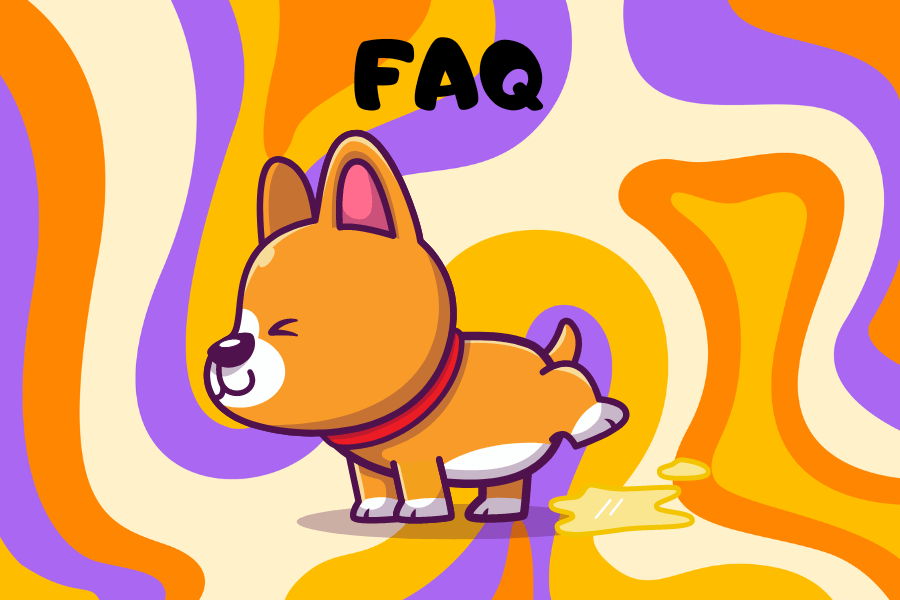
Is My Dog Peeing in the House for Attention?
It might be happening if something has changed in your family lately. Did you bring home a new pet or child? Or did you move to a new house? Big life changes can stress out a dog and make them seek more attention than normal. Some experts would classify it as territory marking, but sometimes, it’s just a cry for more love!
Should You Scold a Dog for Peeing Inside?
No, it’s unlikely to help and might cause your dog to pee in less visible spots where you can’t clean it up as easily. Just wash any soiled areas and take your pup outside to help them make the connection. Or, watch them closely and the next time you catch them trying to pee inside, immediately take them outside.
Can Stress Cause a Dog to Pee in the House?
From family moves to new furry friends, stress can be a major contributor as to why your pup is having accidents indoors. Show them some extra love and kindness so they feel safe during these times of uncertain transition – it could help prevent further messes from happening!
How Do I Tell If My Dog Has a UTI?
If your beloved canine buddy is exhibiting any of the tell-tale signs of a urinary tract infection, such as intense pain while urinating, smelly pee or an increased need to go outside frequently, it’s important that you act quickly and get them checked out by a vet. A UTI can have serious health consequences if left untreated.
Do Dogs Feel Guilty After Peeing in the House?
While it might appear as if Fido knows he’s done wrong by the guilty look in his eyes, dogs are not actually capable of feeling guilt. Instead, when faced with certain scenarios they merely associate negative outcomes and act accordingly. If you want your pup to learn quickly and effectively, then positive reinforcement is key! Rewarding good behavior will go much further than punishing them for bad deeds.
Elizabeth Randolph is a freelance writer and pet enthusiast who has been writing about pets and their care since 2003. She has authored articles on a variety of topics related to pet care, including nutrition, training, health, and behavior. Elizabeth lives in Northern California with her husband and three cats. When she’s not writing, she enjoys hiking and spending time with her family and friends.


